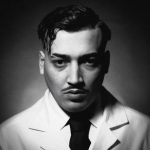The documentary Zappadirected by Alex Winter, is out and it’s full of never-before-seen footage of the legendary rocker
Zappa released more than 60 albums during his lifetime, so a two-hour documentary only scratches the surface of his story. But the unearthed footage should be enough to make fans happy, while the documentary itself serves as the perfect roadmap for future generations of fans, covering everything from Frank’s strange childhood to Freak Out and his death in 1993.
While nothing too revealing appears in the film – at least for longtime fans – here are a few things Zappa neophytes might learn from the documentary:
1. Zappa’s archives could make Prince’s archives pale in comparison
“ Most of the archives have never been seen“, we note at the beginning of the documentary. Zappa also provides snippets of some of his most intriguing audio material, including a tape titled “Clapton at Home” – where the two guitar gods played in his home – as well as another tape capturing the days when Zappa and Captain Beefheart were playing together. The doc also reveals what might be the musician’s finest jam sequence with John Lennon and Yoko Ono.
However, the film’s rapid editing – perhaps an attempt to squeeze in as many images as possible – is sometimes too confusing, which is ironic because…
2. Zappa dreamed of being an editor and not a musician
“ I became obsessed with editing, and I was editing just because I loved it“, reveals Zappa in voiceover. “ I was cutting up some 8mm film that was lying around the house to splice it into whatever else. » One casualty of Zappa’s filmic Frankenstein-ing would be his parents’ 1939 wedding film, which Zappa punctuated with insert shots of flying saucers and nuclear holocaust.
Zappa’s love of editing would eventually permeate his music, with the guitarist pioneering what he called “xenochrony”, in which he slips moments captured on stage into his studio recordings – often stunning guitar solos or a certain drum beat. Zappa later also ended his editing work with The Dub Room Special from 1983, which he built in a post-production center in Burbank.
3. Zappa’s childhood was original to say the least
The son of a chemist, Zappa says he learned to make gunpowder at the age of six and that his father’s job in a Maryland factory that produced chemical weapons like nerve gas shaped his life. mind and vision of the world.
“ Everyone who lived there had to have gas masks in their house in case the mustard gas tanks broke“, said Zappa, noting down the scores. “ The toys I remember growing up were the little beakers that my father brought home, and the gas masks that hung in the hall cupboard. »
After the Zappas left for California, he remained interested in chemistry. “ The last experience I had with explosives was when I was about 15“, Zappa reveals casually in an archival interview. “ I mixed this amount of powder which was regular dark energy and then flash powder, which is 50% zinc, 50% sulfur, mixed with sugar, and tried to put the fire at the high school I attended“.
4. This is an article about the “ ugly music » which pushed Zappa to compose
As Zappa reveals in the documentary, his parents were “ opposed to any involvement in music that might interest me“, but an article about record store magnate Sam Goody and his ability to sell music ” ugly music ” – specifically, the complete works of Edgard Varèse, a French avant-garde composer – piqued Zappa’s curiosity.
5. Zappa wasn’t good at making friends
“ I have no friends” Zappa acknowledged in an interview a few years before his death in 1993. The documentary touches on how the artist always prioritized his own music over personal relationships, even while keeping his longtime collaborators at arm’s length.
As his percussionist, Ruth Underwood, says in the documentary: “ We’d talk for a minute and then he wouldn’t bother with a ‘Thanks for stopping by’ or a ‘See you later’. He would just turn the other way, and I would wait for him to turn around and say (something), but if he did, he would say, “Oh, are you there yet?” Like I was fired, without even being fired… You could interpret that as, “What a self-centered asshole,” but I think he needed to do his job so bad. »
6. He had a very understanding wife
“ I married a composer. I don’t know what he is to others, but to me he was a composer. And you have to be crazy to assume that“Zappa’s widow Gail says in the film, during an exclusive interview recorded before his death.
The documentary covers the moment Frank and Gail met and the tribulations their union faced. It was a complicated marriage where Frank had relationships, sometimes blatant and in full view of the press, with other women while he was traveling.
In an archived interview, the groom Zappa admits: “ I am a human being. I like to fuck. You have to be realistic about these things: You go on the road, you hook up with a group of girls, you come home and you find out you’ve caught something, what are you going to do? ? Hiding it from your wife? So I come back to her and I say: “Look, I’m hot, go get a prescription. So she went out and took some penicillin tablets, we both took them, and that was it. She grumbles from time to time, but she’s my wife. »
While not turning a blind eye to Frank’s misdeeds, Gail offers advice to those considering marrying a musician: “Don’t have these conversations. »
7. The Beatles more or less smoked Zappa
The documentary recalls Zappa’s influence on the Beatles: “ They explicitly said that Sergeant Pepper was our attempt to create their own Freak Out“, says guitarist Mike Keneally, but the Fab Four weren’t exactly grateful for the inspiration. The release of pastiche We’re Only in It for the Money was indeed delayed pending approval from the Beatles, and that didn’t make Zappa’s life any easier.
“ MGM was panicked at the prospect of being sued by the Beatles, and wanted legal assurance that they would not harm them. …All the legal procedures took approximately 13 months“, reports Zappa about his album. I know I spoke to McCartney personally at one point and said, “Is there anything you can do to help me?” And he replied, “ You mean talk business? Oh, we have lawyers who do that.” He simply had no interest in participating in a discussion about the legal ramifications of a parody of the cover of Sgt. Pepper. »
8. Zappa didn’t enjoy his time on the SNL set
When Zappa hosted Saturday Night Live in October 1978, the entertainer’s sober (and ostensibly anti-drug) lifestyle came into conflict with the show’s often rowdy and heavy-drinking crew members. drugs.
One sketch featured Bill Murray and John Belushi as Zappa fans who “freak out” when they learn that their favorite albums were not recorded while under the influence of drugs. A deadpan Zappa delivered his lines, eyes fixed on the boxes, while the SNL cast overreacted around him.
“ I thought the whole sketch was rubbish, and I had to do it“, confides Zappa. “ They wouldn’t let me write anything for the show. » A musical guest in 1976, Zappa never returned to SNL after the show’s debacle in 1978.
9. Zappa accused MTV of damaging the recording industry
Performance art, weird movies (like 200 Motels), Bruce Bickford’s animations and concert videos were important components of Zappa’s music, so one would think he would embrace the arrival of MTV, a channel dedicated to the visual side of music. But he quickly understood that music videos would have a negative and homogenizing impact.






